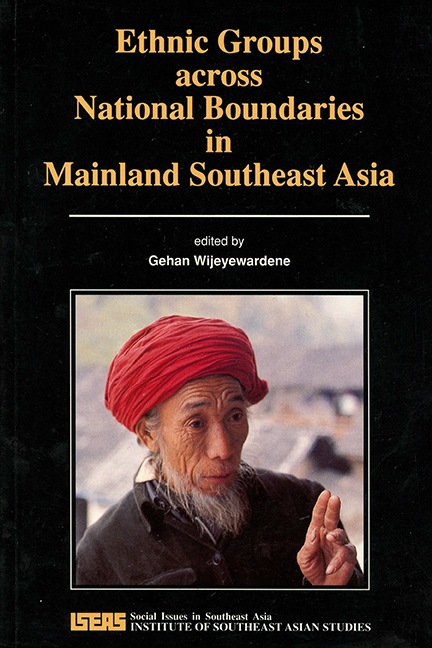Book contents
- Frontmatter
- Contents
- Foreword
- Contributors
- Acknowledgements
- 1 Introduction: Definition, Innovation, and History
- 2 Language and Ethnicity: The Mon in Burma and Thailand
- 3 Thailand and the Tai: Versions of Ethnic Identity
- 4 A Comparative Study of Structure and Contradiction in the Austro-Asiatic System of the Thai-Yunnan Periphery
- 5 Ethnicity, Nationalism, and the Nation-State: The Karen in Burma and Thailand
- 6 Capitalism and the Structure of Yao Descent Units in China and Thailand: A Comparison of Youling (1938) and Pulangka (1968)
- 7 Squatters or Refugees: Development and the Hmong
- 8 Afterword: “Ethnicity” and Anthropology
- Index
- THE EDITOR
8 - Afterword: “Ethnicity” and Anthropology
Published online by Cambridge University Press: 21 October 2015
- Frontmatter
- Contents
- Foreword
- Contributors
- Acknowledgements
- 1 Introduction: Definition, Innovation, and History
- 2 Language and Ethnicity: The Mon in Burma and Thailand
- 3 Thailand and the Tai: Versions of Ethnic Identity
- 4 A Comparative Study of Structure and Contradiction in the Austro-Asiatic System of the Thai-Yunnan Periphery
- 5 Ethnicity, Nationalism, and the Nation-State: The Karen in Burma and Thailand
- 6 Capitalism and the Structure of Yao Descent Units in China and Thailand: A Comparison of Youling (1938) and Pulangka (1968)
- 7 Squatters or Refugees: Development and the Hmong
- 8 Afterword: “Ethnicity” and Anthropology
- Index
- THE EDITOR
Summary
Today many nations, once believed to be completely consolidated, are challenged by “sub”-nationalisms and separatist movements within and across their borders. The essays in this volume occupy a space opened up by the increasing intensity of this ethno-nationalism, directing our attention to the insurrections and rebellions of, amongst others, the Shan, Karen, Hmong, and Wa. The authors represented here also draw on recent theoretical developments, developments which suggest that it is no longer possible to regard “ethnicity” as unproblematic, that to do so is to ignore a process of cultural construction that is integral to the working out of relations between ethnic minorities and the nation-states within which they are encompassed. While these analytical profiles do not present any unified problematic they are all concerned with the dynamics of change, pointing, I will argue, to the possibility of a suspension of belief in fixed identities of either the cultural or the political kind.
Theoretical Approaches
Confidence in the notion of fixed identities reached its high point in the era of functionalist theory. Long the reigning paradigm in ethnographic writing, functionalism rejected the “conjectural history” of evolutionism choosing, instead, to highlight the contribution of practices and beliefs to the maintenance of putatively isolated wholes (Wolf 1982, p. 14). Within this framework, societies and cultures were attributed a spurious coherence and integration (Keesing 1989, p. 28). This view of society as a closed system operating in a state of homeostatic equilibrium thus effected an exclusion of diachronic processes that has, by now, been loudly denounced (for example, Cohn 1980, p. 205).
Societies that could not be incorporated within this model of stasis were thought to be “disintegrating”; this rhetorical construct legitimated the search for funds required by “salvage” ethnography. In the vocabulary of this obituary mode the notion of the inherent fragility of cultures when confronted with the onslaught of the new was fundamental.
- Type
- Chapter
- Information
- Ethnic Groups Across National Boundaries in Mainland SEA , pp. 173 - 184Publisher: ISEAS–Yusof Ishak InstitutePrint publication year: 1990

